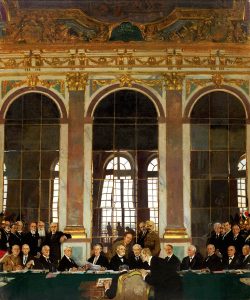
Statue of Europe, Unity in Peace

Dr. Martin Hurcombe,
Reader, School of Modern Languages, University of Bristol
There are some who will no doubt greet the triggering of Article 50 on the 29th March 2017 as an occasion of historical significance. It may seem churlish to even state otherwise, but my sense is that this is not a date that will live long in the memory. It is simply the prelude to events of far greater importance, the scale of which few of us seriously claim to be able to gauge in all their potential complexity.
No doubt, though, politicians and journalists will once again be casting around for historic parallels, for popular aides-mémoires through which the public can grasp the event. They will struggle to find anything quite like this in living memory, so will have to delve deep into our nation’s bag of collective memories. I expect Boris Johnson’s paws will delve the deepest. Out will come toy spitfires, reminders of our island status and how we all pulled together (whoever we are now) in moments of national need.
War memories often act as handy markers of national identity. They are quintessential moments when the nation pulled together. It is therefore unsurprising that the Leave campaign so frequently returned to what Estelle Shirbon of Reuters dubbed ‘Britain’s World War Two fixation’. The Blitz and Churchill (possibly one of the Conservative Party’s most ardent Europeans) were all trotted out, whilst the European Union was depicted by Johnson as Hitler’s victory from beyond the grave.

Bust of Churchill in Parliament Square with EU/UK flags © E. Fortin
We have a very selective memory when it comes to history and particularly the history of the two world wars. This is to a certain extent understandable. The French philosopher Ernest Renan, in what remains one of the key texts for understanding nationalism, declared in 1882 that a nation ‘must have forgotten many things’ in order to remain as one. Nations are therefore built as much on forgetting as on remembering.
What we do remember is increasingly impoverished, largely due to the side-lining of history, and particularly global history, in school curricula. Most English people (we are told now that there is such a thing) cannot tell you anything about the ‘Glorious Revolution’ of 1688, for example. Only the Daily Telegraph appears to have made a semi-serious attempt at finding parallels between it and Brexit. Moreover, the UK’s understanding of the two world wars mainly consists of a series of hand-me-down myths, useful for mobilising mass sentiment, but often short on historical depth and complexity.
The Centenary Anniversary of the First World War offers a case in point. The European memory of the First World War continues to be dominated, quite rightly, by a sense of futility. But if we look at France and the UK, I would argue that both nations, and in particular both governments, put the memory of that futility to very different uses.
Both France and the UK have devoted significant resources to the official commemoration of the centenary: 7 million Euros, from what I can gather in France, but a staggering £50 million in the case of the UK. French government-sponsored activities have focused on the commemoration not only of national suffering, but also of the war’s international dimension.
In September 1984, for example, President François Mitterrand had famously joined hands with Helmut Kohl, the German chancellor, at Douaumont Fort near Verdun, the site of over half a million French and German deaths. And the 2016 centenary commemorations of the Battle of Verdun culminated in a joint ceremony involving President François Hollande and Chancellor Merkel in imitation no doubt of that earlier meeting. The memory of the war was used, perhaps a little cynically, to reaffirm Franco-German friendship and France and Germany’s place at the centre of the European Union, an organisation born of the desire in the 1950s to end nationalistic rivalries and promote international co-operation. Not exactly what Hitler had in mind (#Boris Johnson).
In contrast, the UK has dedicated vast sums to commemorate the Centenary of the First World War, despite the policy of austerity in all other areas of the economy. But while Franco-German relations, and by extension European ones, played a prominent role in French commemorations of Verdun in 2016, while Franco-German relations, and by extension European ones, played a prominent role in French commemorations of Verdun in 2016, the tone in the UK has been very different.

TheSigning of Peace in the Hall of Mirrors, Versailles By William Orpen – Imperial War Museum Collections: https://goo.gl/EI170w
Take the centenary commemorations of the Battle of the Somme last summer which took the form of a series of national vigils. The tone here was one of introspective mourning that encouraged self-reflection and often empathetic identification with the war dead. UK commemorative practices over recent years have evoked at times a conflict divorced from its broader European and global context. Many of those who have supported Britain’s exit from the European Union have drawn upon memories of war, which are similarly introspective and isolationist. This contrasts with any kind of spirit of unity and co-operation that was pursued in its foundation.
When Article 50 is triggered, it may not be the 29 March 2017 that enters the annals of history. Rather it may be the potentially turbulent spring and summer of 2019, when the UK exits the European Union. There is of course another centenary taking place that year: that of the Treaty of Versailles where the map of Europe was redrawn, an empire dismantled and new nation states created. The pursuit of European co-operation and unity in the 1950s was an attempt to repair the damage done by World War Two, a war prepared around the negotiating table of Versailles. Let’s hope that it is the same spirit that prevails in the negotiations of 2019 and not that of national self-interest that drove European nations in 1919.
